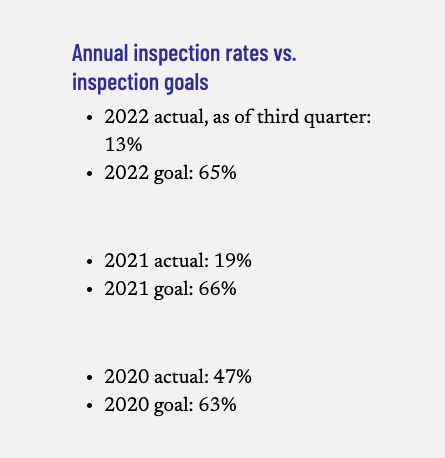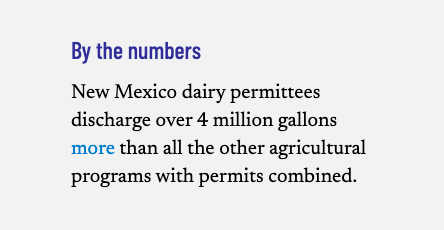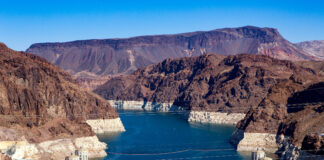
By Megan Gleason
Nearly 80% of New Mexicans depend on groundwater sources for their drinking water, according to the state. But the N.M. Environment Department isn’t keeping up with inspections and enforcement of health standards with those who hold permits to discharge into groundwater systems.
People in New Mexico can discharge liquid waste or pollutants into water sources with permits. This activity is supposed to be monitored by the Environment Department to ensure health standards are being met, and water is still safe to drink. But due to low inspection and enforcement rates, there could be unmonitored groundwater contamination.
There were 597 groundwater permittees reported from January to March, but only 35 inspections — just 6% — were conducted, according to a recently released report by the Legislative Finance Committee. The target goal of 65% for the whole fiscal year likely won’t be met.
This will be the third year in a row the state hasn’t met their goal for groundwater inspections, reports show.
Of the groundwater permittees inspected from January to March, 8% violated health standards. But it’s not likely that they’ll be forced to comply, either.
Environment Department spokesperson Matthew Maez said a lot of violations aren’t being penalized or corrected due to lack of staff. Seven out of 28 inspector positions at the Ground Water Quality Bureau are vacant, leaving the rest of the employees to make up for a missing 25% of the workforce.
He attributed much of these below-target rates to lack of sufficient funding from the state Legislature.
“In general, a significant number of inspections that identify violations are not enforced given the lack of adequate agency funding,” Maez wrote via email.
Dairies, nitrates and drought
Food and Water Watch is a national advocacy organization that advocates for clean water, and spokesperson Jessica Gable said regulation of groundwater discharge is an issue across the nation. In New Mexico specifically, she said most of the organization’s work is related to mega-dairies that play a large part in groundwater contamination.
Dairies in the state account for nearly 20% of all groundwater permittees and are allowed to cumulatively discharge over 6.3 million gallons of waste every day. But, according to Food and Water Watch, 80% of New Mexico’s mega-dairies have half the amount of land necessary to absorb manure nutrients. Gable said that can threaten groundwater, and there’s really none to spare during the historic drought the state is enduring.
When there are excess manure nutrients in groundwater, there’s a risk for that to turn into elevated levels of nitrate that contaminate groundwater sources, Gable said. With drinking water, this can lead to health issues, including cancer and birth defects, according to the National Institutes of Health. Gable said mega-dairies are the primary sources of nitrate contamination in groundwater.
“It’s a vicious cycle, and with any kind of lack of regulation, that is only likely to get worse,” Gable said.
To help with inspection rates, Maez wrote that the department is using innovative technology but still needs staff to “to hold polluters accountable.” They have some incentives, like an employee referral program and pay raises for advanced retirement notice, but he noted that other things like increased funding and competitive salaries “are critical to boosting inspection rates.”
Gable said the immediate solution is a moratorium on new and expanding mega-dairies.
The Food and Water Watch is also calling on the Environment Department to deny more discharge permits, specifying that no permits should be given out times of a drought, permits and renewals shouldn’t be allowed for discharges into highly contaminated aquifers and repeat violators should have their permits terminated.
But the number of groundwater permittees has been increasing still, according to the Legislative Finance Committee report.
And the globe’s just getting hotter.
“This issue is not going to go away as long as this drought continues,” Gable said, “and as long as the climate continues changing.”
The Water Desk’s mission is to increase the volume, depth and power of journalism connected to Western water issues. We’re an initiative of the Center for Environmental Journalism at the University of Colorado Boulder. The Water Desk launched in April 2019 with support from the Walton Family Foundation. We maintain a strict editorial firewall between our funders and our journalism.







